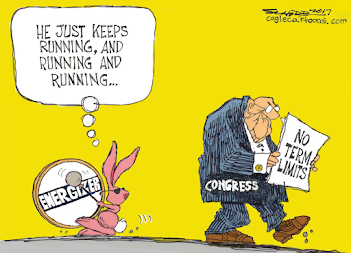The Age Old Question: to Limit or Not to Limit Terms in Congress?
By JT Thomas
There’s an (ironically) old saying in the English language that I rather like: “out with the old, in with the new.”
Essentially, it means that one should keep moving forward in life, whether that be in gaining new skills, gaining new perspectives, or by realizing that, at a certain point, it’s time to move over so that the next generation can take over. It’s this last part that seems to have the U.S. federal government in a bind; over the past year or so, we’ve seen multiple episodes in which some of our longest-serving government officials have shown the effects of their age. From Senator Mitch McConnell (currently aged 81) freezing in press conferences in July and August, to Senator Dianne Feinstein (age 90 at the time of her death) missing 93 total votes due to her medical absence from the Senate floor between the months of February and May of last year, we’ve seen firsthand the difficulties that are inherent to governing at an advanced age.
This issue isn’t limited to these two members. The median age in the Senate is 65 years old, the highest average on record, according to the linked Washington Post article. The average age of the House is slightly better, oscillating between 57 and 58 years old over the past decade, per the same article. Overall, the average age in the 118th United States Congress is 59 years old, one of the oldest medians in the history of the body. Outside of Congress, Joe Biden made history in 2020 when he was elected as the oldest person to ever hold the office of the Presidency. The second oldest person to be elected to the nation’s highest office is Biden’s predecessor and likely opponent in 2024, Donald Trump, who was 70 years of age at the time of his inauguration. Should Biden win reelection in 2024, he’d be 86 at the end of his second term; should Trump win, he’d be 82 by 2028.
According to the U.S. Constitution, a candidate needs to be 35 years of age to run for President, 30 years of age to run for Senate, and 25 years of age to run for the House. Why then is our federal government populated by elected officials who are, on average, twice as old as the respective minimum ages for their jobs? I’m no Poli-Sci major, but if I had to guess, I’d say it’s probably the political version of Newton’s Law of Inertia: people in politics tend to stay in politics unless acted on by an outside force. The longer you’re in the game, the bigger your name gets, and the easier it gets for you to get reelected.
This is, of course, a bit of a problem. The average age of Americans is 38 years, a full two decades younger than the average of our representatives. A lot can happen in 20 years, and a lot has: the conditions of our world have changed, as have political ideals. I’ve heard it said before that American policies tend to drag behind the public’s views; maybe this is part of the reason why.
Limits (whether applied to age or number of terms) to how long an individual can serve in Congress might be one way to help address this issue. Term limits in particular are incredibly popular among American citizens and hold a frankly astounding amount of bipartisan support. Proponents of term limits (which include, heartbreakingly, Ted Cruz of all people) argue that they would help rid Congress of “ineffectual career politicians.” Of course, amendments that limit someone’s tenure in Congress aren’t without flaw: opponents say that removing long-time Congresspeople would severely handicap the level of expertise held on certain issues. Personally, I believe that this might have the unintentional side-effect of forcing legislators to rely more on the expertise of employees within the various bureaucratic departments within the U.S. government, but even still, I see the point. What’s more, I find recent proposals on term limits (such as the one co-sponsored by Cruz) to be far too limiting, not to mention the fact that they seem to be designed to impact Democrats more heavily than Republicans. Personally, I find age limits a more attractive solution.
The question of how to limit an individual’s time in Congress in a fair, equitable way is a tough nut to crack. While I might not find proposals such as Cruz’s to be particularly valid, they are productive in that they start the conversation. I know it might be hard to let go of old guard staples like Bernie Sanders, but as a former theater kid, I stick by Broadway rules: you might miss them, but eventually, it becomes time for your favorite performer to take their final bow and let the show go on.



Comments
Post a Comment